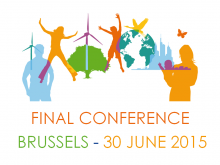Two new reports have been finalized by the CECILIA2050 consortium, both developing future-looking policy scenarios up to the year 2050 by using different approaches. Read more
News
A central question of the CECILIA2050 research project is what role economic instruments such as carbon pricing should have in European climate policies. The following report with the title "Climate Policies and the Transport Sector" takes a closer look at the policy-induced price signals that affect transport in Europe (and abroad) with a focus on road private transport in particular. Read more
On 6 March 2014, the CECILIA2050 consortium held a high-level expert conference in Brussels on the EU’s climate policy beyond 2020. Around 80 participants from industry, NGOs, academia and governments engaged in the discussions on the present and future climate policy mix. Read more
A new report of the CECILIA2050 project analyses the impact of the current EU climate policy instruments on economic activity. The study uses the model GINFORS and the method of counterfactual simulation to analyse the economy-wide effects of current policy instrument mixes concerning economic instruments. The report is now available for download. Read more
Two new CECILIA2050 reports have been published and are now available for download in the publication section of our website. Read more
In November 2013, the first results of the CECILIA2050 research project have been presented by members of the CECILIA2050 consortium during two side events of the 19th Conference of the Parties (COP 19) to the United Nations Framework Convention on Climate Change (UNFCCC). The conference took place from 11 to 22 November 2013 in Warsaw, Poland. Read more
The first CECILIA2050 policy brief is now available online. It presents in short the main results of the research that has been conducted so far by the CECILIA2050 project. This includes an evaluation of the current EU climate policies, against a newly developed definition of optimality and the presentation of the results of nine case studies conducted at the EU level as well as at the Member State level. In addition, recommendations for a future climate policy mix are also part of this policy brief. Read more
This CECILIA2050 report provides a conceptual, a legal and an institutional overview of the European Union as well as its three Member States Germany, Poland and the United Kingdom, in order to highlight prominent regulatory approaches. The report then extracts certain trends and patterns with regard to climate and energy policies from the four case studies and provides policymakers with a number of important aspects, which should be taken into account when designing future policies. The full report on the role of law and institutions in shaping European climate policy can be found and downloaded here. Read more
On the 30th October 2013, a Workshop on Scenarios and Storylines for EU Climate Policy Instrumentation will take place at the University College London (UCL). In the first half of the workshop, the initial results from the modelling work undertaken in the CECILIA2050 project will be presented. These results will be commented on and discussed with the expert participants. The second half of the workshop will concentrate on climate policy instrumentation. In this part of the workshop the EU’s climate policy instrumentation will be discussed, also with regard to an international context. A concluding forum discussion will connect the different topics of the workshop and focus on the future development of climate change policy in the EU and beyond. Read more
In mid September 2013, the members of the two leading FP7 research projects ENTRACTE and CECILIA2050 held a joint workshop on climate policy in Dublin. The topics discussed during the event included recent developments in European climate policy and a review of the ETS performance as well as its future prospects. In addition, the workshop also shed light on the developments and policy measures in Non-ETS sectors at member state level. The presentations of the workshop are now available online and can be downloaded here. Read more


